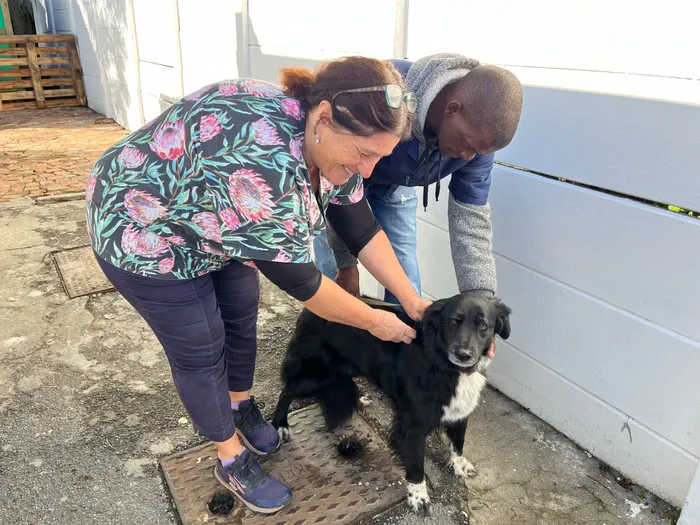Rabies scare sparks vaccination drive

Noordhoek Veterinary Clinic veterinarian Dr Karyn Levy vaccinating Trompette while veterinary assistant Jimmy Mtondo looks on.
Animal shelters and vets have been running rabies vaccination drives after a rabid dog from Capri was put down last month.
At the weekend Noordhoek Veterinary Clinic vaccinated 173 animals – 130 dogs and 43 cats – while Tears Animal Rescue vaccinated 320 animals.
Noordhoek Veterinary Clinic vet, Dr Karyn Levy, said the infected dog, which had had a fever and showed signs of increased aggression, was euthanised along with another injured dog from the same household, as a precaution.
She said the diagnosis of rabies in the one dog had been confirmed by the state vet and the result of the other dog had yet to be released. Recent investigations into seals exhibiting aggressive behaviour, she said, found no evidence of rabies, and rumours that there had been more than one case of rabies were false.
The source of the infection, she said, was not known, and none of the dogs in the household had a recent travel history outside the province.
“Rabies is not endemic in wild animals in the city of Cape Town, with the closest wildlife cases in the past reported in the Paarl area,” she said, adding that the primary risk of rabies introduction came from the movement of infected dogs, which could spread the virus through contact with other dogs in public spaces or through fences.
Rabies, which is virtually 100% fatal once clinical symptoms appear, is transmitted through direct contact between dogs, including licking, scratching, nipping, and biting. It can be transmitted to people through the lick, scratch, or bite of a rabid animal.
Dr Levy said it was critical for anyone bitten by an animal suspected of having rabies to clean the wound immediately with soap and water for 15 minutes then seek further medical attention for post-exposure prophylaxis. This usually includes a series of rabies vaccinations as well as rabies immunoglobulins (RIG), depending on the nature of the bite.
RIG was not available everywhere and a doctor would need to call the nearest public hospital to determine where vaccine and RIG stocks were available.
Bill Robson, of Noordhoek, had his dog, Trompette, vaccinated. “My dog is very precious to me and we are together 24/7,” he said.
Cape of Good Hope SPCA spokesperson, Belinda Abraham, said vaccination of pets was the most effective way of protecting humans and animals from exposure to the virus, and in South Africa it was compulsory, under the Animal Disease Act, to have dogs and cats vaccinated against rabies.
Signs of rabies in animals could vary and pet owners should be aware of changes in their pet’s behaviour, she said.
Signs to look out for include an aggressive or wild animal becoming tame or calm, a calm animal becoming aggressive, paralysis or partial paralysis, dogs barking strangely, animals attacking inanimate objects such as rocks or trees, foaming at the mouth, and a fear of water.
According to the National Institute for Communicable Diseases’s quarterly report from January to April this year, dogs are the primary source of human rabies infections. The report says three cases of human rabies were reported in South Africa from January 1 to April 30. These cases were in KwaZulu-Natal, the Eastern Cape and Gauteng with the latter involving a patient who acquired the disease in Zimbabwe following exposure in December 2023. All the cases involved children aged 2, 5, and 7, respectively.
There will be a free vaccination drive today, Thursday June 6, from 10.30am to 2.30pm, next to Nomzamo Site 5 Masiphumelele clinic.
Ms Abraham said the SPCA was standing by to do rabies vaccination campaigns in conjunction with the state vet initiatives in the Capri area.

Related Topics: